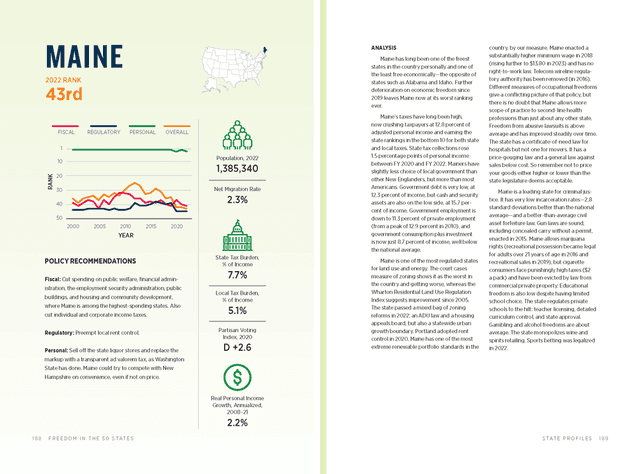Policy Recommendations
- Fiscal Cut spending on public welfare, financial administration, the employment security administration, public buildings, and housing and community development, where Maine is among the highest-spending states. Also cut individual and corporate income taxes.
- Regulatory Preempt local rent control.
- Personal Sell off the state liquor stores and replace the markup with a transparent ad valorem tax, as Washington State has done. Maine could try to compete with New Hampshire on convenience, even if not on price.
Analysis
Maine has long been one of the freest states in the country personally and one of the least free economically—the opposite of states such as Alabama and Idaho. Further deterioration on economic freedom since 2019 leaves Maine now at its worst ranking ever.
Maine’s taxes have long been high, now crushing taxpayers at 12.8 percent of adjusted personal income and earning the state rankings in the bottom 10 for both state and local taxes. State tax collections rose 1.5 percentage points of personal income between FY 2020 and FY 2022. Mainers have slightly less choice of local government than other New Englanders, but more than most Americans. Government debt is very low, at 12.3 percent of income, but cash and security assets are also on the low side, at 15.7 percent of income. Government employment is down to 11.3 percent of private employment (from a peak of 12.9 percent in 2010), and government consumption plus investment is now just 8.7 percent of income, well below the national average.
Maine is one of the most regulated states for land use and energy. The court cases measure of zoning shows it as the worst in the country and getting worse, whereas the Wharton Residential Land Use Regulation Index suggests improvement since 2005. The state passed a mixed bag of zoning reforms in 2022: an ADU law and a housing appeals board, but also a statewide urban growth boundary. Portland adopted rent control in 2020. Maine has one of the most extreme renewable portfolio standards in the country, by our measure. Maine enacted a substantially higher minimum wage in 2018 (rising further to $13.80 in 2023) and has no right-to-work law. Telecom wireline regulatory authority has been removed (in 2016). Different measures of occupational freedoms give a conflicting picture of that policy, but there is no doubt that Maine allows more scope of practice to second-line health professions than just about any other state. Freedom from abusive lawsuits is above average and has improved steadily over time. The state has a certificate-of-need law for hospitals but not one for movers. It has a price-gouging law and a general law against sales below cost. So remember not to price your goods either higher or lower than the state legislature deems acceptable.
Maine is a leading state for criminal justice. It has very low incarceration rates—2.8 standard deviations better than the national average—and a better-than-average civil asset forfeiture law. Gun laws are sound, including concealed carry without a permit, enacted in 2015. Maine allows marijuana rights (recreational possession became legal for adults over 21 years of age in 2016 and recreational sales in 2019), but cigarette consumers face punishingly high taxes ($2 a pack) and have been evicted by law from commercial private property. Educational freedom is also low despite having limited school choice. The state regulates private schools to the hilt: teacher licensing, detailed curriculum control, and state approval. Gambling and alcohol freedoms are about average. The state monopolizes wine and spirits retailing. Sports betting was legalized in 2022.

